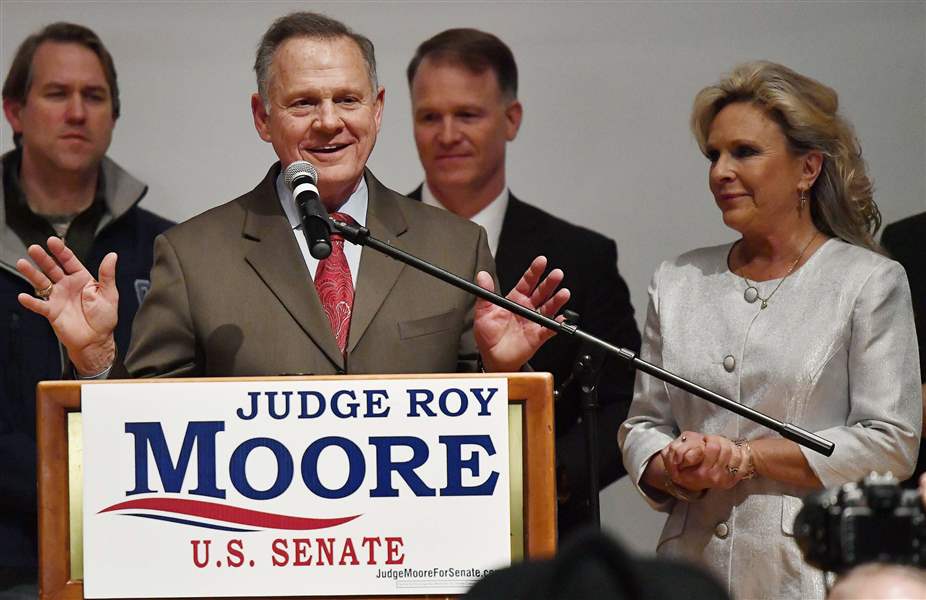
EDITORIAL
Character tips the scales in Alabama
12/13/2017
Roy Moore speaks as his wife Kayla Moore, right, listens at the RSA activity center, Tuesday, Dec. 12, 2017, in Montgomery, Ala.
ASSOCIATED PRESS
Some years ago, the French political philosopher Bertrand de Jouvenel surprised the political class of his country by endorsing a socialist for president of France. Since de Jouvenel was a critic of collectivism and schemes of redistribution of wealth, his act was inexplicable to many. But de Jouvenel said the matter was simple: the socialist candidate was a man of high character and the neo-Gaullist a man of low character.
Many generalizations are being made in many quarters about the meaning of the Alabama special election, in which Doug Jones narrowly defeated Roy Moore for an open U.S. Senate seat. Many more generalizations, extrapolations, and projections will be made. And many, like the ones already made, will be overly broad, even idiotic.
Click here to view more Blade editorials
A race that essentially ends in a tie does not prove much of anything. (And after absentee, military, and provisional ballots are in, the results may be even closer and a recount, mandated by law if the votes are only .05 percentage apart, may be necessary.)
The Alabama results do not change the political landscape. Control of the Senate after the 2018 elections was in play before the vote. The Republican Party was divided and the President and his core constituency were somewhat alienated from the party establishment, before the vote. Little has changed.
The only solid generalization one can make about a populist, pro-choice Democrat winning, by the thinnest of margins, in deep-red Alabama is that, to many voters who are independent, moderate, and not rigidly aligned to a political tribe or ideology, character trumps all other factors. At least character trumps other factors when the character gap is great.
The race was not a referendum on President Trump or his policies. It was a choice between Roy Moore and Doug Jones.
Roy Moore was known in Alabama, indeed the nation, long before he was accused of predatory behavior toward young women, as a demagogue with little respect for the law, or stated or understood rules of behavior. The harassment charges against him, which the Republican leader of the U.S. Senate said he believed, will be sorted by time and historians. But this is a man once ejected from the Alabama State Supreme Court, and once suspended from his duties there, for refusing to obey the law.
Richard Shelby, the senior U.S. senator from Alabama, and a Republican, put it simply. He said that Alabamians deserved better than Roy Moore. Alabama voters, by a very small percentage, agreed.
Mr. Shelby urged a vote, not for the Democrat, but for any write-in candidate of the voter’s choosing. And, indeed, 1.7 percent — slightly higher than the current Jones victory margin — exercised that option for a protest vote.
There is nothing new in any of this. American voters wrote in various names in 1968, when they were unhappy with the choice of Richard Nixon, Hubert Humphrey, and George Wallace. Many voters opted for a third party in 2016, finding the character of both major candidates wanting. And Americans, including prominent ones, have long crossed party lines when the character of their party’s nominee seemed dubious and the character of the other major party’s nominee was high. A good example would be 1996. Some Democrats, convinced that Bill Clinton was a man of low character who would sully the presidency, voted for Bob Dole, a war hero, a highly capable and respected Senate minority and majority leader, and simply a good man, especially for politics.
Doug Jones is, manifestly, a good man. He may have trouble hanging on to his Senate seat in Alabama, but he is a good man.
The real story here is that the radical middle, the “vital center,” as Arthur Schlesinger, Jr., called it, of our politics still exists. There is still a cadre of American voters who are fundamentally politically independent. There are citizens who believe they vote for the person, above all else, including platform. Country over party is an obvious and incontrovertible proposition for them.
In this race, with the character gap so large, the vital center included many, many conservatives, who are, for example, pro-tax cuts and anti-abortion. And it included not a few Republican office holders who said that one Senate seat was not worth helping Roy Moore get to the most august legislative body in the world.
American politics sometimes seems to drift far left or far right, or lurch toward reaction and hysteria. But the brilliance of our Madisonian system and the good sense of the people usually restores balance. In this race, just enough people determined that character should tip the scales.